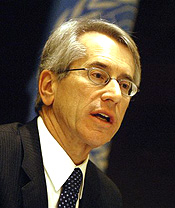voa标准英语2008-UN Security Council Has 'Cautious Optimism' for
搜索关注在线英语听力室公众号:tingroom,领取免费英语资料大礼包。
(单词翻译)
A delegation1 from the U.N. Security Council has just returned from Afghanistan, where they say there has been some progress on several fronts, giving them a sense of "cautious optimism" for the future. |
| Italian Ambassador Giulio Terzi, head of the U.N. mission to Afghanistan, speaking in Kabul, 28 Nov 2008 |
Italian Ambassador Giulio Terzi led the four-day mission last week and briefed the full Security Council. His country is the fifth-largest troop contributor to the NATO-led forces in Afghanistan, with about 2,300 soldiers participating in the 51,000-member force.
Ambassador Terzi said Afghanistan is facing a difficult security situation, but not a security crisis.
"This qualification is based on the acknowledgment that the insurgency2 is concentrated in specific regions and does not offer any alternative model of government, despite the illusion it creates of being omnipresent," he said.
The ambassador said improved relations with neighboring Pakistan, recent cabinet appointments, a 19 percent reduction in Afghanistan's opium3 cultivation4 and the registration5 of nearly two million Afghans in the first two phases of the voter registration project were reasons to be cautiously optimistic about the country's future.
 |
| Afghanistan President Hamid Karzai (File) |
On the subject of Afghan peace talks, Ambassador Terzi said there is growing national support for President Hamid Karzai's position that any talks with the Taliban be based on their renunciation of violence and acceptance of the Afghan constitution.
"On national reconciliation6, we noted7 an increasing consensus8 among Afghan interlocutors on the concept that any dialogue with anti-government elements must be conducted by the Afghan authorities from a position of strength and that the renunciation of violence and respect for the Afghan constitution must constitute the red lines of any negotiation," he said.
He added that negotiations9 must be a complement10 to the fight against terrorism, not an alternative. And the reconciliation process must lead to democratization, not to an increased influence of Taliban ideology11 on Afghan society.
Ambassador Terzi said the impact of the conflict on civilians12 is an issue of particular concern to the Security Council and was the subject of in-depth discussions during the visit. He said insurgents13 cause most casualties and that the NATO-led international force is making every effort to avoid such incidents.
While in Afghanistan, the mission visited the capital, Kabul, as well as the northwestern province of Herat. They met with President Karzai, parliament members, civil society groups, and representatives of NATO, human rights groups, the diplomatic community and the U.N. country team.
 收听单词发音
收听单词发音 




